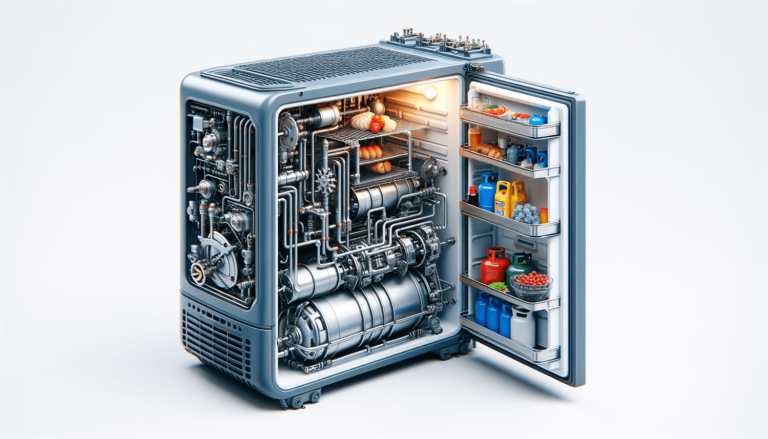

A propane refrigerator functions through a unique absorption cooling system, utilizing a mixture of water, ammonia, hydrogen gas, and propane as fuel. In stark contrast to electric refrigerators that rely on a compressor and refrigerant, a propane refrigerator harnesses heat to initiate a cooling cycle. This process begins with the propane heating a solution of ammonia and water in the boiler, turning the ammonia into a gas, which then circulates through the system, absorbing heat and cooling the interior of the refrigerator.
Quick summary
At Setting King, we’re dedicated to providing clear, comprehensive advice on how all kinds of appliances work, including the somewhat enigmatic propane refrigerator. Let’s dive deeper into the workings of this fascinating device.
The propane refrigerator’s cooling process is ingenious. It begins in the boiler, where propane burns and heats a solution of ammonia and water to the boiling point. The heating causes the ammonia to separate from the water and rise as a gas into the condenser coils, where it cools and returns to a liquid form. This phase transition releases heat, which is expelled outside the refrigerator.
From the condenser, the ammonia liquid moves to the evaporator, where it comes into contact with hydrogen gas. The presence of hydrogen reduces the pressure that allows the ammonia to evaporate at a lower temperature, absorbing heat from the refrigerator’s interior and thus cooling it. Meanwhile, the water, now free of ammonia, returns to the boiler to restart the cycle.
Propane refrigerators offer several advantages:
While the benefits of propane refrigerators are significant, there are some considerations to keep in mind:
In conclusion, propane refrigerators employ a distinctive absorption cooling technique to achieve refrigeration, showcasing a brilliant example of leveraging chemical reactions to solve practical problems. At Setting King, we trust that this breakdown helps demystify how these appliances keep your perishables cool without the need for conventional electricity, offering a reliable solution for various challenging settings. Whether you’re outfitting a remote cabin or looking for an energy-efficient appliance, understanding the workings of a propane refrigerator can guide your choice toward versatile and dependable refrigeration.